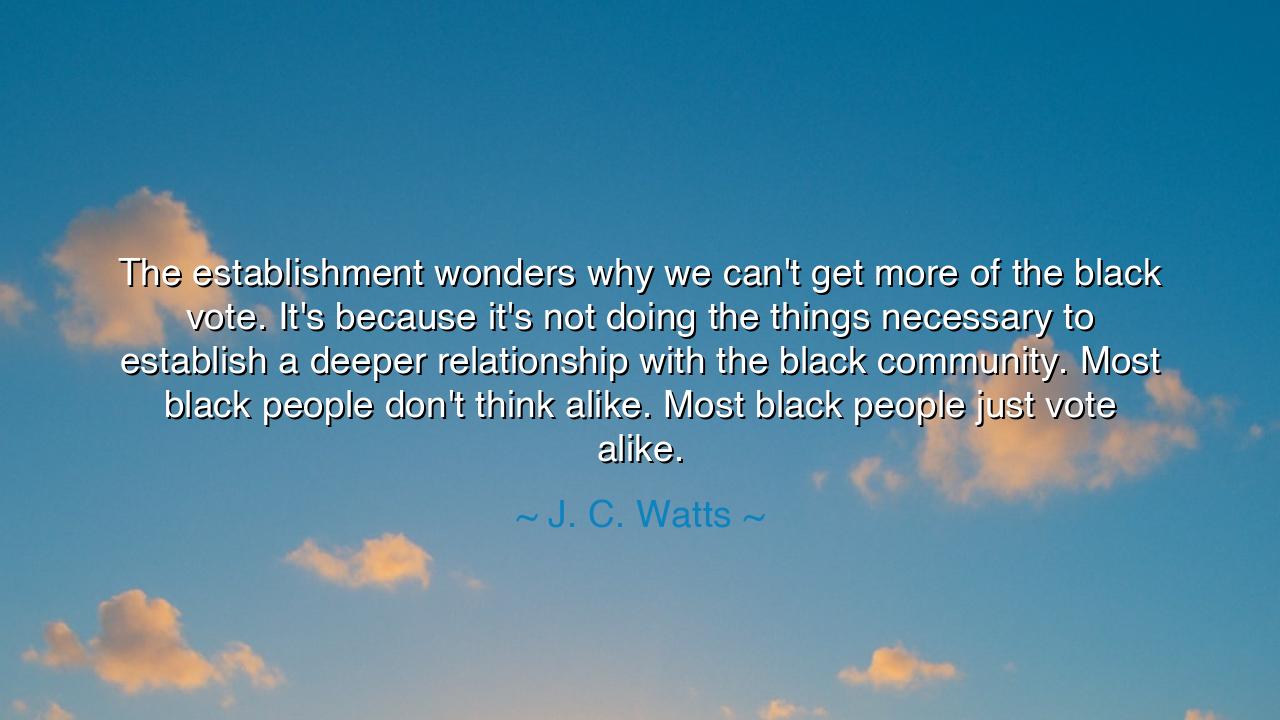
The establishment wonders why we can't get more of the black
The establishment wonders why we can't get more of the black vote. It's because it's not doing the things necessary to establish a deeper relationship with the black community. Most black people don't think alike. Most black people just vote alike.






In the realm of governance and the shaping of nations, there lies a chasm between rulers and the ruled, between those who speak and those whose voices go unheard. J. C. Watts proclaims with clarity and fire, “The establishment wonders why we can’t get more of the black vote. It’s because it’s not doing the things necessary to establish a deeper relationship with the black community.” These words strike like a bell in the silence, reminding us that true leadership is not about power alone, but about connection. Without relationship, there can be no trust, and without trust, no unity.
The black community, like any people, is vast and diverse, filled with many dreams, struggles, and voices. Watts warns, “Most black people don’t think alike. Most black people just vote alike.” Here lies a great truth: unity in action is not always born from unity of thought, but often from shared history and collective pain. The act of voting together may arise not from identical beliefs, but from a common desire to heal old wounds and resist forces that have long misunderstood or neglected them. It is a unity forged in the fires of survival.
The failure of the establishment comes not from ignorance of policies alone, but from a deeper blindness — the unwillingness to truly listen. To “establish a deeper relationship” is to walk among the people, to hear their stories, to understand their needs beyond the surface. Just as a tree cannot bear fruit without tending its roots, so too can a nation bear no harmony without nourishing its most vulnerable communities. Words and promises are empty if not matched by deeds that honor dignity and justice.
The origin of this lesson stretches back through generations of struggle. From the days when voices were silenced and chains were heavy, to the long marches for civil rights, the bond between the people and those in power has been tested and often found wanting. Watts’ words rise from this history, a call to leaders to rise above mere strategy and seek true fellowship. To see the black community not as a voting bloc, but as human souls with diverse hopes and visions.
Thus, let this wisdom be carried forward: if leaders desire the loyalty of a people, they must first offer them respect and understanding. Votes may be won by fear or favor, but hearts are only won through love and justice. Let no man assume that a people are simple or singular in thought, for beneath their outward unity lies a thousand different voices, waiting to be heard by those wise enough to listen.






PPhat
Watts’ statement highlights a significant issue in politics—how the black vote is often treated as a uniform bloc. But how can politicians avoid this generalization and create platforms that truly address the diversity of issues within the community? Should politicians be focusing more on tailored outreach, or are there larger systemic issues at play that prevent meaningful connections?
KHLe Diep Kha Hy
J.C. Watts makes an interesting point about how political parties seem to take the black vote for granted, assuming it's a given. This kind of thinking might be why there’s a disconnect. What steps do you think political organizations need to take to build genuine, lasting relationships with the black community instead of relying on surface-level strategies?
TNMai Thanh Ngan
This quote by J.C. Watts points to a larger issue: the oversimplification of voter blocs based on race. It’s an important reminder that groups aren’t monolithic. Do you think that political parties often take voters for granted, assuming they can win them over with basic policies rather than understanding the deeper, nuanced concerns of each community?
Mmanh
J.C. Watts’ comment about the black vote really sheds light on how political parties often fail to connect meaningfully with the black community. It's not just about votes—it’s about genuine relationships and understanding diverse needs. Do you think political strategies should focus more on listening and building those connections, rather than just assuming a one-size-fits-all approach?